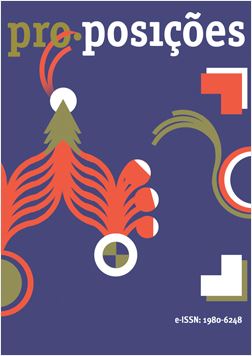Abstract
Considering that the performing artist’s creative act seeks to make another being present through their personal memory and the evocation of living experiences and feelings, this article reflects on the direct and objective relation of the actor’s creative work with life. Accordingly, we address here manifestations that intend presentification more than representation, a practice that arose later, but which is associated with Vygotsky’s writings on the art of acting. Thus, we seek to consider the term perezhivanie as a manifestation in a hybrid zone of intersection of life with artistic creation and as a consequence (or source) of the art exercised by the one that is now called actor-performer.
References
Aristóteles. (1987). Poética. Nova Cultural. (Original publicado em c. 350 a.C.)
Capucci, R. R. (2017). Perejivanie: um encontro de Vigotski e Stanislavski no limiar entre psicologia e arte [Dissertação de Mestrado, Universidade de Brasília]. Repositório Institucional da UnB. https://repositorio.unb.br/handle/10482/23604?mode=full
Capucci, R. R., & Silva, D. N. H. (2018). “Ser ou não ser”: a perejivanie do ator nos estudos de L.S. Vigotski. Estudos de Psicologia, 35(4), 351-362.
Danan, J. (2019). A dramaturgia no tempo do pós-dramático. Revista Cena, (29), 14-23.
Delari Junior, A., & Passos, I. V. B. (2009). Alguns sentidos da palavra “perejivanie” em Vigotski: notas para estudo futuro junto à psicologia russa [artigo apresentado]. III Seminário Interno do Grupo de Pesquisa Pensamento e Linguagem (GPPL), Capinas, São Paulo, Brasil.
Fischer-Lichte, E. (2019). Estética do performativo Orfeu Negro.
Gorchakov, N. M. (1956). Las lecciones de “regisseur” de Stanislavski Ediciones Pueblos Unidos.
Grotowski, J. (2015). Performer (P F. de Mendonça, trad.). eRevista Performatus, 3(14).
Knebel, M. (2016). Análise-ação: práticas das ideias teatrais de Stanislavski (M. Tenório, & D. Moschkovich, trad.). Editora 34.
Marinis, M. (2005). En busca del actor y del espectador Galerna.
Pavis, P. (1999). Dicionário de teatro Perspectiva.
Pavis, P. (2017). Dicionário da performance e do teatro contemporâneo Perspectiva.
Platão. (2004). A República Nova Cultural. (Original publicado em c. 380 a.C.)
Smagorinsky, P. (2011). Vygotsky’s Stage Theory: The Psychology of Art and the Actor under the Direction of Perezhivanie Mind, Culture, and Activity, 18(4), 319-341.
Stanislavski, C. (1976). A construção da personagem Civilização Brasileira.
Stanislavski, C. (1989). Minha vida na Arte Civilização Brasileira.
Vigotski, L. S. (1999). Psicologia da arte Martins Fontes.
Vigotski, L. S. (2009). Sobre o problema da psicologia do trabalho criativo do ator (A. Delari Jr., Trad.). Original publicado em: Vygotsky, L. S. On the problem of the psychology of the actor’s creative work. In L. S. Vygotsky. The collected works of L. S. Vygotsky (Vol. 6). Kluwer Academic; Plenum Publishers.
Vigotski, L. S. (2023). Sobre a questão da psicologia da criação pelo ator. (P.N. Marques, Trad.). Pro-Posições, 34, ed0020210085. http://dx.doi.org/10.1590/1980-6248-2021-0085 (Obra original publicada em 1936).
Vygotsky, L. S. (1999). On the problem of the psychology of the actor’s creative work. In L. S. Vygotsky. The collected works of L. S. Vygotsky (Vol. 6). Kluwer Academic; Plenum Publishers.

This work is licensed under a Creative Commons Attribution-NonCommercial 4.0 International License.
Copyright (c) 2023 Pro-Posições


